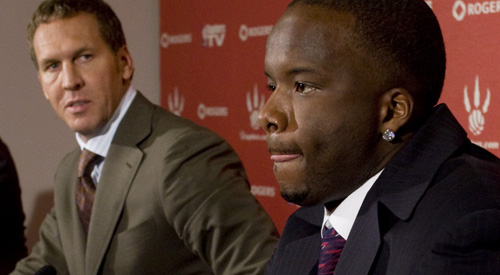
Pain for Pleasure
There are few constant truths in the world of professional sports. No one stays at the top forever, and no formula guarantees success every time. All that is certain is that one way or another you have to give up something of potential value in order to get something else. What you get in return may result in the achievement of great success, respect and ultimately victory, or conversely produce more of the ever prevalent mediocrity that characterizes the bulk of professional sport franchises.
Such is the life of a general manager in the National Basketball Association. One player can make the difference, and it is this understanding that leads to experiments, also known as trades. It is through these experiments that one can evaluate the player’s overall contribution to the organization’s desire to move forward progressively.
The general manager is a unique entity. He deals with both the executive stakeholders and the operations staff, and to no fault of his own, his level of influence and power is far greater in the room full of money, than in the room where it’s being spent.
For this reason, these experiments occur increasingly often, as those who are losing the money are rarely patient enough to see the big picture. A team can spend years on the cusp of greatness, only to fall short because of financial restrictions, collective bargaining qualms, and more often than not, the inability to sit back and let things play out. As such, teams give up on their experiments before their projected impact on the betterment of the franchise genuinely shines through.
[php snippet=1]
Coming into this season, two front offices planned to evaluate the success of their recently conducted experiments. The Miami Heat held their first training camp with Shawn Marion, since they acquired him from Phoenix in exchange for Shaquille O’Neal, while the Toronto Raptors were staging their first camp following the summer acquisition of Jermaine O’Neal.
With trade rumours swirling from the warmth of South Beach all the way to the frigid Ontario metropolis of Toronto, it seems that these two recently undertaken experiments will cease to continue before either were able to prove their true worth. In their place will be two new experiments, based more on team needs than the previous talent-based decisions.
With the recent emergence of Andrea Bargnani the Raptors have secured their five-man of the future, and as such O’Neal has become expendable. Left exposed are the deficiencies of their perimeter defense and offensive prowess from the wing positions, which both would be addressed by the addition of the Matrix.
The Heat conversely are in the market for a big, and with Marion, rookie Michael Beasley and Udonis Haslem all playing virtually the same position, Pat Riley feels the need to strengthen his frontcourt at the five. Of the three, Marion has the largest contract, the strongest reputation, and would bring the most value in return.
While still speculation for the time being, the trade seems a virtual certainty due to the manor in which both teams have utilized their personnel in recent days. The by-product of their discussions being politically-fuelled excuses as to why neither player (and Marcus Banks, whose also rumoured to be involved) has suited up with their respective squads in their last outings.
Toronto says they’re resting J.O. The Heat claim the Matrix pulled his groin and Marcus Banks is apparently suffering from back spasms, while the rest of us really know what’s going on. Neither team wants to see their trading pieces injured before the deal goes through.
The question as to whether these experiments will work better than the last ones remains to be seen, with the only certainty remaining that each team will hypothetically be giving up on one player in order to try their hand with another. If the result is a successful one then expect the respective general managers to be heralded as saviours, and if team chemistry, and by extension performance, declines, then ownership will once again grow impatient and a new experiment will no doubt be undertaken to mask the failings of the first.
And so continues the cycle. The general manager hopes his positive experiments outweigh his negatives, as too many of the latter will result in his swift replacement. The volatile business of sports takes many a prisoner, and a scapegoat is never very difficult to find.
[php snippet=1]

